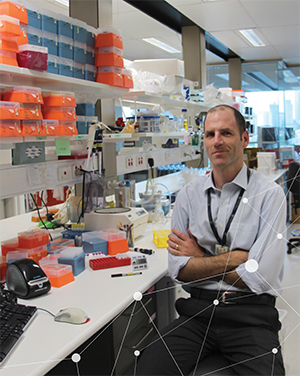Taking a unique approach to blood cancers

Associate Professor Steven Lane
A drive to find effective treatments for acute leukaemia is one of the primary factors that saw Associate Professor Steven Lane awarded a prestigious inaugural CSL Centenary Fellowship.
The five-year fellowship, one of only two awarded nationally, will provide research salary and project support for Dr Lane to expand his leukaemia model to examine how different drugs work on different genes.
His aim is to develop personalised treatment for patients with resistant types of leukaemia.
“The majority of acute leukaemia can’t be cured,” Dr Lane says. “We need to find ways to prevent leukaemia relapsing, or coming back after chemotherapy treatment.”
His twelve person team looks at all types of blood cancers, focusing on the three main types of myeloid leukaemia – acute myeloid leukaemia, myeloproliferative neoplasm, and myelodysplastic syndrome. They’re interested in the link between leukaemia, blood cells and stem cells, particularly whether there are indicators of likelihood of relapse after chemotherapy.
As a haematologist at Royal Brisbane and Women’s Hospital, Dr Lane says being a clinician helps with his research.
“As a clinician, I’m able to put research into context and hopefully I’ll be able to see which research findings are likely to be applicable and transferrable to patients,” he says.
“If you’re removed from the clinic, it’s difficult to understand how to draw the line from basic scientific discoveries to helping patients.”
The research team is using ‘CRISPR’ gene editing technology to convert normal cells into leukaemia cells, allowing in vivo modelling and analysis of aboratory grown leukaemia. In other work, Dr Lane’s lab is examining new drugs to treat leukaemia cells. This work will inform clinical trials to study gene expression and
genetics and the response to drugs.
“We are trying to understand how cells respond to and escape from chemotherapy,” he says. “We can take leukaemia cells and apply CRISPR genome wide screens.
“We are already good at analytical genomics. That means we can predict who will and won’t respond and be cured, but not how the genetic changes cause these unfavourable responses.”
Leukaemias are highly aggressive cancers with short survival and more treatment options are needed to improve the outcome for patients. The aim is to decipher why some genes will lead to bad patient outcomes and find new treatment pathways.
Dr Lane says leukaemia and blood cancers are “model cancers” for research. Treatments for other cancers have evolved from blood cancer research, due to ease of access of samples and world leading research in this field. The studies to date have also indicated that some blood cancers may be more like other types of cancers, which gives rise to new treatment options as well.
“We are moving to a molecular classification of cancers that is based on the underlying genetics of the cancer, rather that what these cells look like under a microscope,” he says.
With awards like the CSL Centenary Fellowship providing new hope and support in the fight against cancer, the future is bright.
